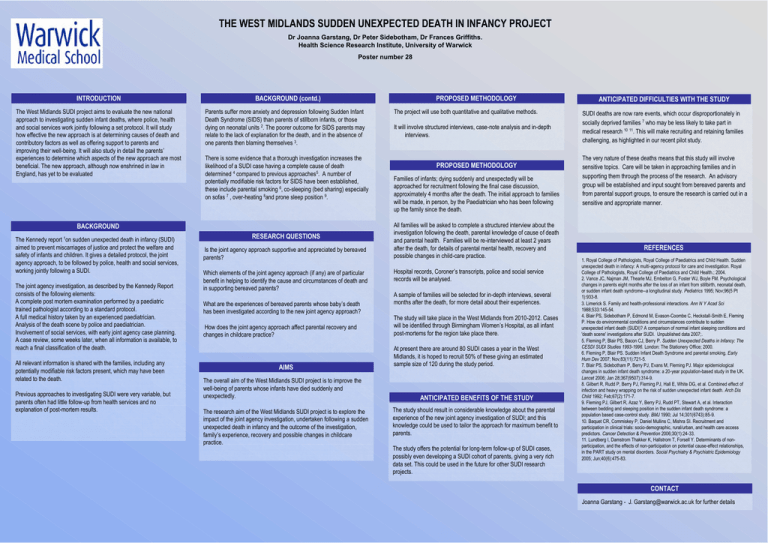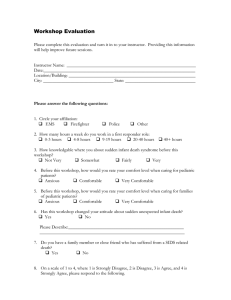THE WEST MIDLANDS SUDDEN UNEXPECTED DEATH IN INFANCY PROJECT
advertisement

THE WEST MIDLANDS SUDDEN UNEXPECTED DEATH IN INFANCY PROJECT Dr Joanna Garstang, Dr Peter Sidebotham, Dr Frances Griffiths. Health Science Research Institute, University of Warwick Poster number 28 INTRODUCTION The West Midlands SUDI project aims to evaluate the new national approach to investigating sudden infant deaths, where police, health and social services work jointly following a set protocol. It will study how effective the new approach is at determining causes of death and contributory factors as well as offering support to parents and improving their well-being. It will also study in detail the parents’ experiences to determine which aspects of the new approach are most beneficial. The new approach, although now enshrined in law in England, has yet to be evaluated BACKGROUND (contd.) Parents suffer more anxiety and depression following Sudden Infant Death Syndrome (SIDS) than parents of stillborn infants, or those dying on neonatal units 2. The poorer outcome for SIDS parents may relate to the lack of explanation for the death, and in the absence of one parents then blaming themselves 3. There is some evidence that a thorough investigation increases the likelihood of a SUDI case having a complete cause of death determined 4 compared to previous approaches5. A number of potentially modifiable risk factors for SIDS have been established, these include parental smoking 6, co-sleeping (bed sharing) especially on sofas 7 , over-heating 8and prone sleep position 9. BACKGROUND 1on The Kennedy report sudden unexpected death in infancy (SUDI) aimed to prevent miscarriages of justice and protect the welfare and safety of infants and children. It gives a detailed protocol, the joint agency approach, to be followed by police, health and social services, working jointly following a SUDI. The joint agency investigation, as described by the Kennedy Report consists of the following elements: A complete post mortem examination performed by a paediatric trained pathologist according to a standard protocol. A full medical history taken by an experienced paediatrician. Analysis of the death scene by police and paediatrician. Involvement of social services, with early joint agency case planning. A case review, some weeks later, when all information is available, to reach a final classification of the death. All relevant information is shared with the families, including any potentially modifiable risk factors present, which may have been related to the death. Previous approaches to investigating SUDI were very variable, but parents often had little follow-up from health services and no explanation of post-mortem results. RESEARCH QUESTIONS Is the joint agency approach supportive and appreciated by bereaved parents? Which elements of the joint agency approach (if any) are of particular benefit in helping to identify the cause and circumstances of death and in supporting bereaved parents? What are the experiences of bereaved parents whose baby’s death has been investigated according to the new joint agency approach? How does the joint agency approach affect parental recovery and changes in childcare practice? AIMS The overall aim of the West Midlands SUDI project is to improve the well-being of parents whose infants have died suddenly and unexpectedly. The research aim of the West Midlands SUDI project is to explore the impact of the joint agency investigation, undertaken following a sudden unexpected death in infancy and the outcome of the investigation, family’s experience, recovery and possible changes in childcare practice. PROPOSED METHODOLOGY The project will use both quantitative and qualitative methods. It will involve structured interviews, case-note analysis and in-depth interviews. PROPOSED METHODOLOGY Families of infants; dying suddenly and unexpectedly will be approached for recruitment following the final case discussion, approximately 4 months after the death. The initial approach to families will be made, in person, by the Paediatrician who has been following up the family since the death. All families will be asked to complete a structured interview about the investigation following the death, parental knowledge of cause of death and parental health. Families will be re-interviewed at least 2 years after the death, for details of parental mental health, recovery and possible changes in child-care practice. Hospital records, Coroner’s transcripts, police and social service records will be analysed. A sample of families will be selected for in-depth interviews, several months after the death, for more detail about their experiences. The study will take place in the West Midlands from 2010-2012. Cases will be identified through Birmingham Women’s Hospital, as all infant post-mortems for the region take place there. At present there are around 80 SUDI cases a year in the West Midlands, it is hoped to recruit 50% of these giving an estimated sample size of 120 during the study period. ANTICIPATED BENEFITS OF THE STUDY The study should result in considerable knowledge about the parental experience of the new joint agency investigation of SUDI; and this knowledge could be used to tailor the approach for maximum benefit to parents. The study offers the potential for long-term follow-up of SUDI cases, possibly even developing a SUDI cohort of parents, giving a very rich data set. This could be used in the future for other SUDI research projects. ANTICIPATED DIFFICULTIES WITH THE STUDY SUDI deaths are now rare events, which occur disproportionately in socially deprived families 7 who may be less likely to take part in medical research 10 11. This will make recruiting and retaining families challenging, as highlighted in our recent pilot study. The very nature of these deaths means that this study will involve sensitive topics. Care will be taken in approaching families and in supporting them through the process of the research. An advisory group will be established and input sought from bereaved parents and from parental support groups, to ensure the research is carried out in a sensitive and appropriate manner. REFERENCES 1. Royal College of Pathologists, Royal College of Paediatrics and Child Health. Sudden unexpected death in infancy: A multi-agency protocol for care and investigation. Royal College of Pathologists, Royal College of Paediatrics and Child Health.; 2004. 2. Vance JC, Najman JM, Thearle MJ, Embelton G, Foster WJ, Boyle FM. Psychological changes in parents eight months after the loss of an infant from stillbirth, neonatal death, or sudden infant death syndrome--a longitudinal study. Pediatrics 1995; Nov;96(5 Pt 1):933-8. 3. Limerick S. Family and health-professional interactions. Ann N Y Acad Sci 1988;533:145-54. 4. Blair PS, Sidebotham P, Edmond M, Evason-Coombe C, Heckstall-Smith E, Fleming P. How do environmental conditions and circumstances contribute to sudden unexpected infant death (SUDI)? A comparison of normal infant sleeping conditions and 'death scene' investigations after SUDI. Unpublished data 2007;. 5. Fleming P, Blair PS, Bacon CJ, Berry P. Sudden Unexpected Deaths in Infancy: The CESDI SUDI Studies 1993-1996. London: The Stationery Office; 2000. 6. Fleming P, Blair PS. Sudden Infant Death Syndrome and parental smoking. Early Hum Dev 2007; Nov;83(11):721-5. 7. Blair PS, Sidebotham P, Berry PJ, Evans M, Fleming PJ. Major epidemiological changes in sudden infant death syndrome: a 20-year population-based study in the UK. Lancet 2006; Jan 28;367(9507):314-9. 8. Gilbert R, Rudd P, Berry PJ, Fleming PJ, Hall E, White DG, et al. Combined effect of infection and heavy wrapping on the risk of sudden unexpected infant death. Arch Dis Child 1992; Feb;67(2):171-7. 9. Fleming PJ, Gilbert R, Azaz Y, Berry PJ, Rudd PT, Stewart A, et al. Interaction between bedding and sleeping position in the sudden infant death syndrome: a population based case-control study. BMJ 1990; Jul 14;301(6743):85-9. 10. Baquet CR, Commiskey P, Daniel Mullins C, Mishra SI. Recruitment and participation in clinical trials: socio-demographic, rural/urban, and health care access predictors. Cancer Detection & Prevention 2006;30(1):24-33. 11. Lundberg I, Damstrom Thakker K, Hallstrom T, Forsell Y. Determinants of nonparticipation, and the effects of non-participation on potential cause-effect relationships, in the PART study on mental disorders. Social Psychiatry & Psychiatric Epidemiology 2005; Jun;40(6):475-83. CONTACT Joanna Garstang - J. Garstang@warwick.ac.uk for further details
